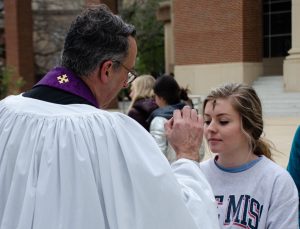
For many, Wednesday, Feb. 14 was all about hearts, flowers and the color pink. For others, the day had an additional meaning: People across the world bore dark, smudged crosses on their foreheads in observance of Ash Wednesday, a Christian holy day marking the beginning of Lent.
Students turned out in droves to receive their ashes, a symbol of repentance and devotion to God.
“We have an explosion of people that come to Ash Wednesday services,” Father Mark Shoffner of UM’s Catholic Campus Ministry said. “Probably 800 more people than we’d normally get on a Sunday.”
With this influx of students entering St. John the Evangelist Catholic Church in Oxford comes an increase in church involvement, at least in the beginning.
“There are a good number of them that maybe do take it to mean a bit more regularized, intentional following of the Gospel that they believe in,” Shoffner said. “So they’ll come to mass extra, they’ll come to events at the church extra (and) they’ll be around here a little bit more.”
A penitent observance of the Christian faith, Lent commemorates the 40 days that Jesus Christ spent fasting in the desert. For the next 40 days, those who celebrate Lent will reflect on the life of Jesus and ways they can grow in their faith, all in preparation for Easter Sunday on March 31.
Lent is frequently associated with giving up something for the purpose of spiritual self-improvement. Shoffner has given up sweets this Lent in order to use prayer over pleasure for consolation. There is, however, one thing you cannot give up for Lent.
“I have to remind people giving up a sin is not a proper Lenten penance,” Shoffner said. “You’re already not supposed to be doing the sin.”
There are unique ways of observing Lent, such as the digital application Exodus 90. The app is a 90-day program aimed at men that encourages intense asceticism, such as taking cold showers, foregoing sweets and refraining from television use.
“I took it on because several of my friends were taking it on as well, and I was encouraged by the idea of having this community of men that was doing this hard thing,” Noah Watson, a senior electrical engineering major, said. “It’s very difficult to pray or fast well if we’re isolated.”
Watson’s experience with Exodus 90 highlights not only the communal aspect that Lent can take on but also the ways in which the observance has been affected by the digital age. For junior Merritt Tompkins, a Southern studies major and student leader at the Episcopal Church at Ole Miss, Lent illuminates the detrimental effects of social media.
“I think that people, especially students, are acutely aware of how much social media can rule their lives,” Tompkins said. “In the conversations about Lenten disciplines I’ve had, social media, and especially TikTok, come up as something to possibly ‘give up.’ A lot of people expressed it was a practice that they didn’t think they could successfully accomplish.”
But for the Rev. Allison Wehrung, the campus minister for Presbyterian student organization UKirk, social media’s relationship with Lent is a bit more nuanced.
“It’s a bit of a double-edged sword,” Wehrung said. “Social media can be a distraction or a way that we numb ourselves, and it can be a way for us to connect with people and build that community.”
Although people often think of Lent as a time of sacrifice, others observe it by taking on a new discipline that adds meaning to their life.
“This year, the practice that I added is inspired by an author named Courtney Ella. I’m an amateur birder, and so the practice that she invited people to participate in is quietly looking for birds like she does, but also paying attention to nature for 10 minutes a day,” Wehrung said. “Set a timer so you don’t even have to look at the watch and just pay attention and see what God offers up to you in that time.”
The observance is both communal and a time for growth, according to the Episcopal Church at Ole Miss faculty adviser Kristen Walker.
“Lent is a great opportunity to do something you have wanted to do that may take you a little outside of your comfort zone but that you know would be a great way for you to grow,” Walker said.
For all of the pastors interviewed, a firm emphasis remained on Lent’s purpose as a spiritually edifying season that turns the observer to God and as an experience that is open to everyone.
“It’s a good way for someone who is desiring to go further into that spiritual life that all of us have within us to voluntarily choose a better usage of our time, our energy and our goods so that we can be more spiritually aware to the voice of God that calls out to all people,” Shoffner said. “It’s not spring cleaning, but you can find stuff when you clean your room.”


























